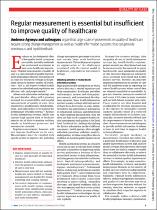| dc.contributor.author | Jackson, Debra | |
| dc.contributor.author | Agweyu, Ambrose | |
| dc.contributor.author | Hill, Kathleen | |
| dc.date.accessioned | 2023-05-19T08:01:37Z | |
| dc.date.available | 2023-05-19T08:01:37Z | |
| dc.date.issued | 2023 | |
| dc.identifier.citation | Agweyu, A., Hill, K., Diaz, T., Jackson, D., Hailu, B.G. and Muzigaba, M., 2023. Regular measurement is essential but insufficient to improve quality of healthcare. bmj, 380. | en_US |
| dc.identifier.uri | https://doi.org/10.1136/bmj-2022-073412 | |
| dc.identifier.uri | http://hdl.handle.net/10566/8922 | |
| dc.description.abstract | Background: Evidence on the detrimental effect of low quality health systems on preventable mortality worldwide has accelerated investments in large scale healthcare improvement. Regular measurement of quality of care is a core principle of quality improvement programmes that has been promoted in some low resourced settings as the primary means to improve quality of healthcare— that is, the degree to which health services for individuals and populations are effective, safe, and people centered. | en_US |
| dc.language.iso | en | en_US |
| dc.publisher | BMJ | en_US |
| dc.subject | Routine health information systems (RHIS) | en_US |
| dc.subject | Healthcare | en_US |
| dc.subject | Measurement | en_US |
| dc.subject | Managers | en_US |
| dc.subject | Leadership and learning systems | en_US |
| dc.title | Regular measurement is essential but insufficient to improve quality of healthcare | en_US |
| dc.type | Article | en_US |

